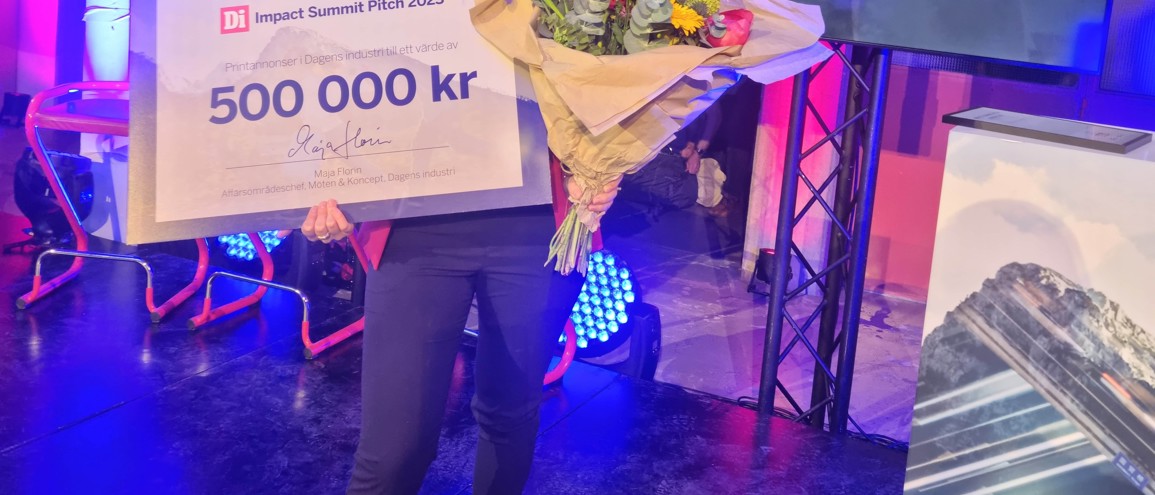Nathalie’s pitch brings home dual prizes for PLT
Polar Light Technologies, which is based on research from Linköping University, brought home both prizes at the DI Impact Summit Pitch in May. The company's revolutionary microLED technology, the next generation in LED technology after OLED and QLED, enables six million pixels to be packed into a one inch area.
Polar Light Technologies (PLT) is the result of years of research by Professor Per-Olof Holtz and his research team at Linköping University in the area of optoelectronics development. The research focuses on microLEDs – the next generation in LED technology after OLED and QLED.
“Our pixels are so small that it is possible to get at least six million pixels in an area of one inch with the technology we are developing. And because they are brighter and use less energy, they enable augmented reality (AR) applications and play an important role in the display industry's green transition. Our products require less material to produce and also cut energy consumption in half”, emphasizes Marketing Manager Nathalie Elsässer.
With its MOCVD manufacturing facility, the company can accelerate new applications in AR; for example, AR smart glasses that look like a regular pair of glasses, and heads-up displays that enable airplanes to land in bad weather or to display critical information on car windscreens instead of forcing the driver to look away from the road.
“Other examples of what microLEDs have the potential to do in the displays we use today are laptops, which can be used outdoors in direct sunlight. And, for example, smart watches with a longer lifespan and phones with a significantly improved battery life”.
Opportunities through LEAD's technology incubator
PLT was founded in 2014 and made its big breakthrough six years later in 2020.
“That was when we managed to get electric light for the first time. In other words, you apply current, and the diode lights up, just like with a normal light. Then we entered into an industrialization phase with the development of our first blue demonstrators, so that we have something to show. Our goal is to sign our first customer agreement at the turn of the year 2023/24”.
The company is linked to LEAD's technology incubator in Linköping and was funded through external capital in 2021 amounting to SEK 14 million, with Stockholm Business Angels (STOAF) being the largest funder. Linköping's Business Angels are also included.
In fact, it was through LEAD that Nathalie Elsässer came into contact with PLT's COO Ivan Martinovic.
“After my engineering studies in industrial economics at Linköping University, my first opportunity came in LEAD's fantastic trainee programme, and then I worked with LEAD validating the potential of companies to scale up. Then I met Ivan on LEAD's ‘magical’ sofa for a conversation, and things moved pretty quickly up to the time I was hired in 2022”.

Nathalie played a key role in the DI Impact Summit Pitch in May 2023 – the competition for Sweden's most innovative impact companies.
The 26-year-old did such a magnificent job pitching her company that Polar Light Technologies won both classes in a tough competition with five other finalists from different industries.
“Of course, it was incredibly exciting and cool. And especially since we won half a million kroner in a marketing and expansion package for the US. The US is a large, important market for us. There are a number of manufacturers of smart glasses, which is one of our first markets."
Since PLT is at the absolute cutting edge of technology and physics, there are significant challenges.
Big goals for the future
“The technical challenges come when we try to industrialize and optimize light sources that are only thousandths of a millimetre in size. We have enormous potential and believe in what we are doing. It is a huge market worth approximately 180 billion dollars”.
Just three years ago, Polar Light Technologies was a one-person company. Now there are twelve employees and more on the way.
“We have big goals for the future, namely, to build an Östergötland semiconductor industry and become the next Swedish technology export”, says Nathalie.
For her part, she has moved back to her hometown of Stockholm, but commutes weekly to Linköping.
“I have always enjoyed Linköping and it is truly a city of the future that is at the forefront of technology development. I am particularly impressed by the universities, which, despite being small by international standards, have given birth to an incredible number of successful companies”, stresses Nathalie.
